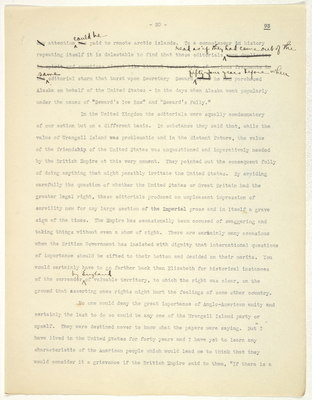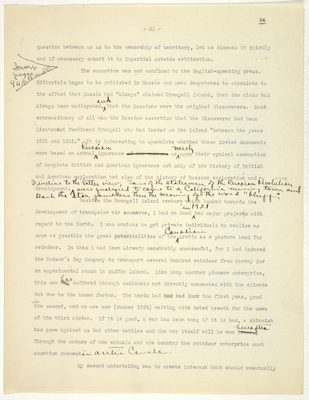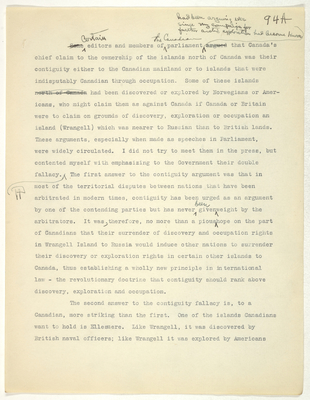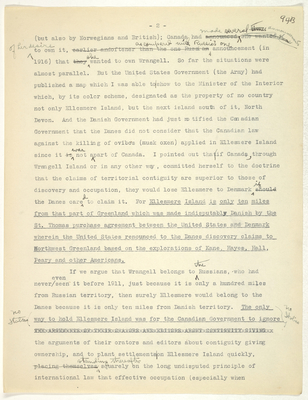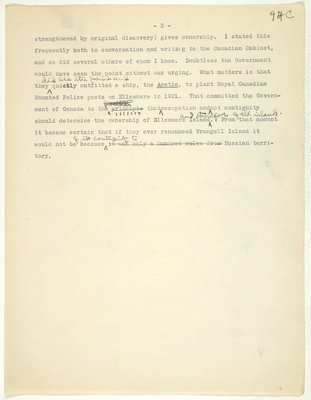Pages
stefansson-wrangel-09-27-055
- 30 - 93
any attention was could be paid to remote arctic islands. To a connoisseur in history repeating itself it is delectable to find that these editorials read as if they had come out of the were duplicates in spirit and sometimes almost like literal [busnseripte] of various fragments in the editorial storm that burst upon Secretary Seward aford fifty-four years before where he had purchased Alaska on behalf of the United States - in the days when Alaska went popularly under the names of "Seward's Ice Box" and "Seward's Folly."
In the United Kingdom the editorials were equally condemnatory of our action but on a different basis. In substance they said that, while the value of Wrangell Island was problematic and in the distant future, the value of the friendship of the United States was unquestioned and imperatively needed by the British Empire at this very moment. They pointed out the consequent folly of doing anything that might possibly irritate the United States. By avoiding carefully the question of whether the United States or Great Britain had the greater legal right, these editorials produced an unpleasant impression of servility new for any large section of the Imperial press and in itself a grave sign of the times. The Empire has occasionally been accused of swaggering and taking things without even a show of right. There are certainly many occasions when the Britisn Government has insisted with dignity that international questions of importance should be sifted to their bottom and decided on their merits. You would certainly have to go farther back than Elizabeth for historical instances of the surrender by England of valuable territory, to which the right was clear, on the ground that asserting ones rights might hurt the feelings of some other country.
No one would deny the great importance of Anglo-American amity and certainly the last to do so would be any one of the Wrangell Island party or myself. They were destined never to know what the papers were saying. But I have lived in the United States for forty years and I have yet to learn any characteristic of the American people which would lead me to think that they would consider it a grievance if the British Empire said to them, "If there is a
stefansson-wrangel-09-27-056
94 - 31 -
question between us as to the ownership of territory, let us discuss it quietly and if necessary submit it to impartial outside arbitration.
Insert pages 94A,B and C
The commotion was not confined to the English-speaking press. Editorials began to be published in Russia and news despatches to circulate to the effect that Russia had "always” claimed Wrangell Island, that the claim had always been undisputed, and that the Russians were the original discoverers. Most extraordinary of all was the Russian assertion that the discoverer had been Lieutenant Ferdinand Wrangell who had landed on the island "between the years 1821 and 1824." It is interesting to speculate whether these Soviet documents were based on actual Russian ignorance of the author or merely upon their cynical assumption of complete British and American ignorance not only of the history of British and American exploration but also of the history of Russian exploration and development. I incline to the letter view. Some of the statesmen of the Russian Revolution were qualified to come to a California mining town and teach the star gawkers there the meaning of the word "bluff".
Besides the Wrangell Island venture which looked towards the development of transpolar air commerce, I had on hand in 1921 two major projects with regard to the North. I was anxious to get private individuals to realize as soon as possible the great potentialities of the Canadian Arctic as a pasture land for reindeer. In this I had been already measurably successful, for I had induced the Hudson's Bay Company to transport several hundred reindeer from Norway for an experimental ranch in Baffin Island. Like many another pioneer enterprise. this one had has suffered through accidents not directly connected with the climate but due to the human factor. The herds had [kxjg] bad luck the first year, good the second, and we are now (summer 1924) waiting with bated breath for the news of the third winter. If it is good, a war has been won; if it is bad, a skirmish has gone against us but other battles and the war itself will be won later hereafter. Through the nature of the animals and the country the reindeer enterprise must sometime succeed in Arctic Canada.
My second undertaking was to create interest that should eventually
stefansson-wrangel-09-27-057
94A
Some Certain editors and membres of the Canadian parliament had been arguing ever since my compaign for further artic exploration had become knewer argued that Canada's chief claim to the ownership of the islands north of Canada was their contiguity either to the Canadian mainland or to islands that were indisputably Canadian through occupation. Some of these islands north of Canada had been discovered or explored by Norwegians or Americans, who might claim them as against Canada if Canada or Britain were to claim on grounds of discovery, exploration or occupation an island (Wrangell) which was nearer to Russian than to British lands. These arguments, especially when made as speeches in Parliament, were widely circulated. I did not try to meet them in the press, but contented myself with emphasizing to the Government their double fallacy.
The first answer to the contiguity argument was that in most of the territorial disputes between nations that have been arbitrated in modern times, contiguity has been urged as an argument by one of the contending parties but has never been given weight by the arbitrators. It was, therefore, no more than a pious hope on the part of Canadians that their surrender of discovery and occupation rights in Wrangell Island to Russia would induce other nations to surrender their discovery or exploration rights in certain other islands to Canada, thus establishing a wholly new principle in in ternational law - the revolutionary doctrine that contiguity should rank above discovery, exploration and occupation.
The second answer to the contiguity fallacy is, to a Canadian, more striking than the first. One of the islands Canadians want to hold is Ellesmere. Like Wrangell, it was discovered by British naval officers; like Wrangell it was explored by Americans
stefansson-wrangel-09-27-058
- 2 - 94B
(but also by Norwegians and British); Canada-, had announced made several announcements she wanted that her desire to own it, earlier andofterner than the one Russian as compared with Russia's one announcement (in 1916) that they she wanted to own Wrangell. So far the situations were almost parallel. But the United States Government (the Army) had published a map which I was able to show to the Minister of the Interior which, by its color scheme, designated as the property of no country not only Ellesmere Island, but the next island souih of it, North Devon. And the Danish Government had just no tified the Caiadian Government that the Danes did not consider that the Canadian law against the killing of ovibos (musk oxen) applied in Ellesmere Island since it is was not a part of Canada. I pointed out that if Canada, through Wrangell Island or in any other way , committed herself to the doctrine that the claims of territorial contiguity are superior to those of discovery and occupation, they would lose Ellesmere to Denmark if should the Danes care to claim it. For Ellesmere Island is only ten miles from that part of Greenland which was made indisputably Danish by the St. Thomas purchase agreement between the United States and Denmark wherein the United States renounced to the Danes discovery claims to Northwest Greenland based on the explorations of Kane, Hayes, Hall, Peary and other Americans.
If we argue that Wrangell belongs to the Russians, who had even A
never even seen it before 1911, just because it is only a hundred miles from Russian territory, then surely Ellesmere would belong to the Danes because it is only ten miles from Danish territory. The only way to hold Ellesmere Island was for the Canadian Government to ignore no Stolies THE ARGUMENTS OF THEIR ORATORS AND EDITORS ABOUT CONTIGUITY GIVING the arguments of their orators and editors about contiguity giving ownership, and to plant settlements on Ellesmere Island quickly, placing themselves standing thereafter squarely on the long undisputed principle of international law that effective occupation (especially when
stefansson-wrangel-09-27-059
- 3 - 94C
strengthened by original discovery) gives ownership. I stated this frequently both in conversation and writing to the Canadian Cabinet, and so did several others of whom I know. Doubtless the Government would have seen the point without our urging. What matters is that they did sea the point and quietly outfitted a ship, the Arctic, to plant Royal Canadian Mounted Police posts on Ellesmere in 1921. That committed the Government of Canada to the position principle that oceupation and not contiguity should determine the ownership of Ellesmere Island and therefore of all islands. From that moment it became certain that if they ever renounced Wrangell Island it would not be because of its contiguity to it was only a hundred miles from Russian territory.
